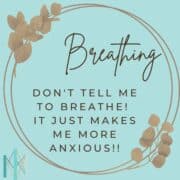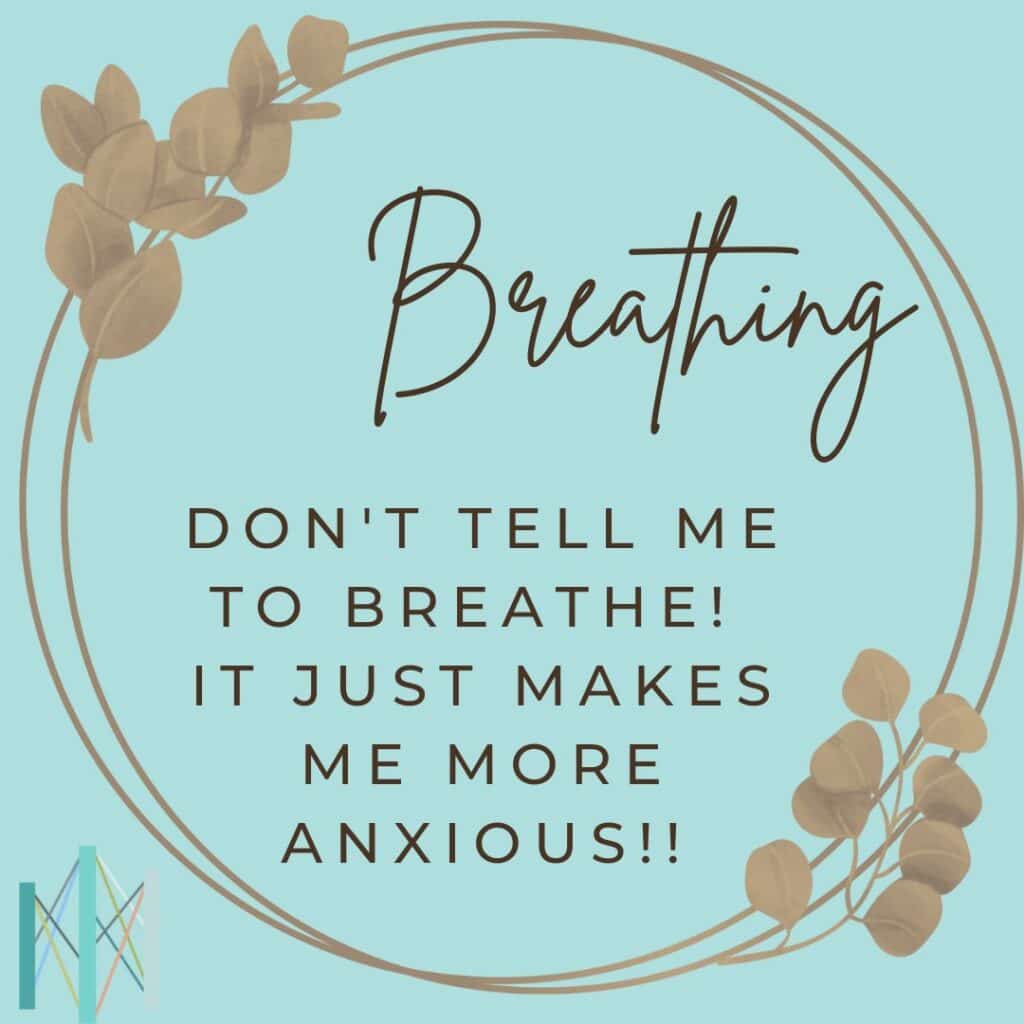

Breathing exercises are everywhere. From mindfulness apps to therapy sessions, from yoga classes to well-meaning friends, the advice to “just take a deep breath” is often offered as a universal remedy for stress, anxiety, and overwhelm. And for many people, it helps.
But what if it doesn’t?
What if being told to focus on your breath actually makes you feel more anxious—lightheaded, panicked, or even feeling trapped in your own body? If that sounds familiar, you’re not alone. While breathwork can be a powerful tool for relaxation, it’s not universally calming. In fact, for some people, it can be triggering.
Let’s explore why this happens, how therapy can help, and what alternatives exist if traditional breathwork doesn’t feel right for you.
Why Does Focusing on My Breath Make Me Anxious?
It might seem confusing—after all, breathing is supposed to be natural and automatic. But when we suddenly become aware of it, especially in an effort to “control” it, it can backfire.
Here’s why:
1. Hyperawareness & Over-Focus
Some people become hyper-aware of their breathing, which can feel overwhelming rather than relaxing. Instead of feeling soothed, you might find yourself fixating on each inhale and exhale, worrying that you’re doing it “wrong” or feeling unable to return to automatic breathing.
2. A History of Breath-Related Anxiety
If you’ve ever had a panic attack, asthma attack, or experience of breathlessness, focusing on your breath can bring back memories of distress. Your body might associate breath awareness with those moments of struggling to breathe, making deep breathing feel more like a threat than a relief.
3. A Nervous System That’s Already Over-Activated
When we’re anxious, our sympathetic nervous system is already on high alert. For some people, certain breath techniques—especially ones involving deep or extended inhales—can actually increase feelings of panic or dizziness rather than calming the system.
4. Feeling a Loss of Control
Breathwork often asks us to “let go” and allow our bodies to take over naturally. But if you’ve experienced trauma or have a need to stay in control, this kind of surrender might feel unsettling rather than soothing.
5. Dissociation & Disconnection
Some people with a history of trauma, PTSD, or high anxiety struggle with feeling disconnected from their bodies. Instead of grounding them, focusing on breath can make them feel disoriented or even more detached.
If any of these sound familiar, know that it’s okay. You’re not “bad” at breathing, and you’re not broken. It just means that the typical approaches to breathwork may not be the right fit for you—and that’s where therapy can help.
How Therapy Can Help If Breathwork Feels Uncomfortable
If breath-focused techniques increase your anxiety, a therapist can help you understand why and explore other ways to regulate your emotions. Here’s what that might look like:
1. Finding What Works for Your Nervous System
A therapist trained in somatic therapy, mindfulness-based therapy, or trauma-informed approaches can help you explore alternative techniques that don’t require direct breathwork but still support your body in feeling safe.
2. Adjusting Breathwork to Feel Safe
Not all breath techniques are the same. If deep inhales feel triggering, a therapist might guide you toward gentler alternatives, like:
- Focusing on the exhale rather than the inhale.
- Humming or sighing instead of structured breathing.
- Counting breaths passively rather than actively controlling them.
3. Exploring Past Experiences
If breathwork feels overwhelming due to past trauma, medical issues, or anxiety-related experiences, therapy provides a space to process these connections in a way that feels safe and supported.
4. Expanding Your Regulation Toolbox
Breathing exercises are just one way to regulate the nervous system—but they’re not the only way. Therapy can help you discover other grounding techniques that don’t involve focusing on breath at all.
Alternatives to Breathwork If It Doesn’t Work for You
If breathwork doesn’t feel helpful (or makes things worse), there are plenty of other ways to regulate your emotions and calm your nervous system.
Here are some therapist-recommended alternatives:
1. Movement-Based Grounding
Instead of focusing on breath, try using movement to shift your energy and regulate your body.
- Progressive Muscle Relaxation (PMR): Tense and release different muscle groups to relieve tension.
- Shaking or Jumping: A quick shake-out of the arms, legs, or whole body can discharge built-up stress.
- Gentle Stretching or Walking: Slow, intentional movement can help settle the nervous system without forcing stillness.
2. Sensory-Based Techniques
Engaging your senses can help anchor you in the present moment without needing to focus on breath.
- Holding something cold (like an ice cube) can snap you out of spiraling thoughts.
- Sipping a warm drink provides comfort and grounding.
- Tuning into sounds (music, nature, white noise) can be a calming distraction.
3. Externalizing the Focus
For some, inward focus increases anxiety. Instead, try engaging with the outside world.
- 5-4-3-2-1 Technique: Name five things you see, four things you hear, three things you can touch, two things you smell, and one thing you taste.
- Holding an object: A stone, piece of fabric, or textured item can provide a physical grounding point.
- Watching something repetitive: Flowing water, a candle flame, or moving clouds can naturally regulate breathing without needing to think about it.
4. Vocalization & Sound
Humming, singing, or even repeating a word or phrase can help regulate the nervous system without requiring deep breathing.
- Humming (like a bee or with lips closed) stimulates the vagus nerve, promoting relaxation.
- Chanting or repeating a mantra provides rhythmic, calming focus.
- Softly talking to yourself (self-soothing phrases like “I am safe”) can reinforce a sense of security.
5. Co-Regulation & Connection
Sometimes, regulating emotions alone is difficult. Instead, try grounding through connection.
- Petting an animal can naturally regulate breathing and heartbeat.
- Talking to a friend or therapist shifts focus outward while creating emotional safety.
- Listening to a guided meditation (without breath focus) can offer structure without triggering anxiety.
You Don’t Have to Force Breathwork
If breathwork makes you anxious, you don’t have to force it. There is nothing wrong with you, and you are not alone.The idea that deep breathing should work for everyone is a myth—we all have different nervous system responses, histories, and ways of feeling safe in our bodies.
Therapy can help you:
- Understand why breathwork feels difficult.
- Explore alternative ways to regulate emotions.
- Find a practice that feels supportive, rather than forced.
You deserve to feel safe in your own body. And if traditional breathwork isn’t the right fit, that’s okay—there are plenty of other ways to find calm, connection, and relief.
Interested in exploring breathwork and its alternatives with the support of a therapist? Our team can help. Contact us today for an appointment or browse our therapist directory to find the California therapist who is right for you.





